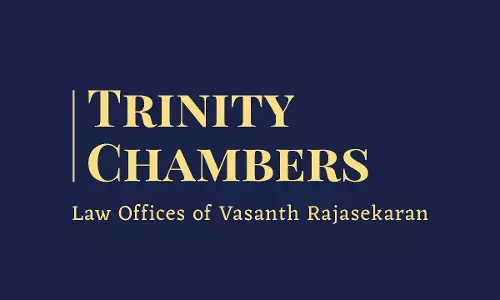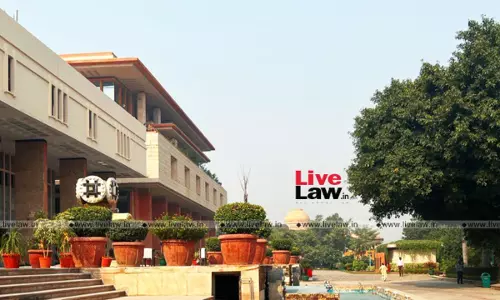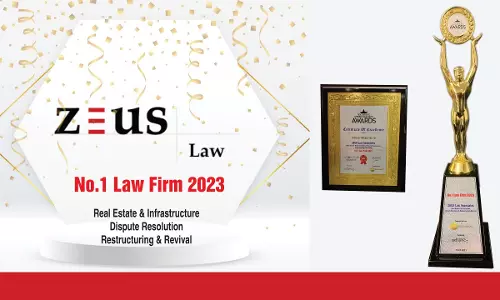Law Firm Articles
Artificial Intelligence Lacks Personhood To Become The Author Of An Intellectual Property
Traditionally, humans are supposed to have intelligence and create innovative or novel work capable of being recognized to be registered as intellectual property and the same belief has been reflected in the legislators of the IP laws.What if there is a machine or software that can comprehend the information fed into it to create an intelligence far more superior, accurate, and readily available for everybody. Why should such intelligence be treated differently and not be provided the rights...
From Instructing (An Advocate) To Return All The Briefs To Conflict Of Interest: Where Are We Headed?
Legal profession is largely considered to be one of the oldest professions in the world. An advocate, in addition to being a professional, is also an officer of the court and plays a vital role in the administration of justice and in order to do so, an advocate has to take up cases, without any compulsion, restriction and / or favour and represent his or her clients to the best of his or her ability.A while back, a regulator in India asked one of its empanelled law firms (“Firm”) to return all...
BLINKHIT And MISSED: Blinkhit Private Limited vs. Blink Commerce Private Limited (Blinkit)
The Supreme Court has refused to restore the temporary injunction order passed by the additional City Civil Judge Bangalore on account of the Appellant i.e. Blinkhit Private Limited, having failed to establish any concrete business activity/ financial transaction since its inception. The court further upheld the Karnataka High Court’s order of setting aside the trial court’s order on being erroneous.Brief BackgroundThe Addl. City Civil Judge, Bangalore vide its order dated August 10, 2022 passed...
Strategic Insights Into Dawn Raids: A Crucial Tool In India's Anti-Trust Arsenal
In the Indian anti-trust law framework, the term "dawn raids" is a frequently used colloquial expression but not formally defined. It refers to sudden and unannounced search and seizure operations conducted when the Competition Commission of India (CCI), i.e., India's anti-trust regulatory authority, suspects that enterprises are indulging in anti-competitive activities. Dawn raids may be conducted at any time, including holidays, when businesses are least likely to expect search operations and...
Evolving Legal Framework Of Online Skill-Based And Chance-Based Games
In the realm of Indian law, a pivotal distinction exists between "Game of Skills" and "Game of Chance." Game of Skills, can be identified by their reliance on the knowledge of the player, experiences, expertise, abilities and skill. In stark contrast, "Game of Chance" focuses on randomness and luck, sidelining the skills of the player, knowledge, or experience. These games find their outcomes tied to fortuitous events, rendering players with limited influence over results.A milestone within...
Landed Value For Injury Analysis In An Anti-Dumping Duty Investigation Cannot Be A “Notional Value”
The Central Government, acting on the recommendation of the Director General of Trade Remedies (“Designated Authority”) in its Final Findings dated 5th May, 2023[1], had imposed Anti-dumping duty on the imports of Single Mode Optical Fibre from China PR, Korea RP and Indonesia, vide Notification No. 7/2023- Cus (ADD) dated 3rd August, 2023[2]. The duties come as a big relief to the Indian manufacturers of Single Mode Optical Fibre (SMOF), which is primarily used for making Optical Fibre Cables...
Cyber Resilience For Government Entities: A Legal Blueprint
The Indian Computer Emergency Response Team (CERT-In), an organ of Ministry of Electronics and Information Technology (MeitY), is the national nodal agency for responding to computer security incidents in India. Recently, guidelines have been issued by CERT-In regarding the security practices to be adopted by the government entities for ensuring a safe and trusted internet (‘Guidelines’).The Guidelines are to consolidate best practices related to information security practices and procedures...
Doctrine Of Separability And Its Multi-Faceted Approach
An arbitrator is the creature of an agreement between the parties, i.e. arbitration agreement, and draws his powers and jurisdiction from it. This makes the survival of an arbitration clause a sine qua non for the validity of any arbitration proceedings. In the realm of arbitration, there may come a situation when the main contract become invalid, consequently, resulting in the invalidity of the arbitration clause which was embedded in the main contract itself. If such argument would be...
Enforceability Of Judgement Of US Courts In India - A Perspective From Sarah Luke And Adidas Cyber Case
According to Merriam Webster, cyber-attack refers to as “an attempt to gain illegal access to a computer or computer system for the purpose of causing damage or harm.” Cyber attackers attempt to capitalise on human or security flaws in order to directly steal passwords, data, or money. Most prevalent being: hacking includes theft associated with social media and email passwords; phishing - the practise of sending fraudulent emails requesting sensitive information and personal information and...
Delhi High Court Orders Quashing Of CCI Proceedings In Ericsson And Monsanto Cases
Delhi High Court, vide its judgment dated 13.07.2023, which is expected to have significant and positive ramifications across the industry, has quashed the CCI investigations into allegations of abuse of dominant position against Ericsson and Monsanto emanating from acts of exercising patent rights. Ericsson’s Case - A Deep Dive Ericsson holds a huge portfolio of Standard Essential Patents (SEPs)[i] related to telecom technologies such as 2G, 3G, etc. which are standardised by Standard...
The Influencing Industry: Balancing Power, Ethics, and Protection
Social media influencers significantly influence consumer choices, but the rise of incorrect advice and misleading information raises concerns. Blindly following influencers can have adverse consequences, highlighting the need for research and guidance. Regulatory measures and guidelines promote transparency and protect consumers. Influencers must prioritise disclosure, clear communication, due diligence, and understanding of consequences. By adhering to policies, influencers contribute to a...
‘Advance Medical Directive’ Or ‘Living Will’- Decoded
The unpredictability of life during the COVID 19 pandemic that affected almost all countries around the world, reinforced the requirement and created an awareness among people about the importance of succession planning and writing their Wills well in time. A Will is a document whereby a testator devises the bequest plan of his estate which comes in effect upon the demise of the testator. In contrast, an advance medical directive commonly known as ‘Living Will’, which has gained ground...













